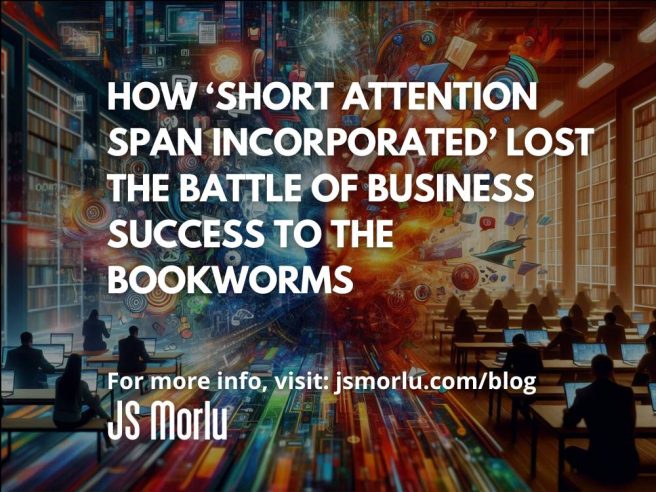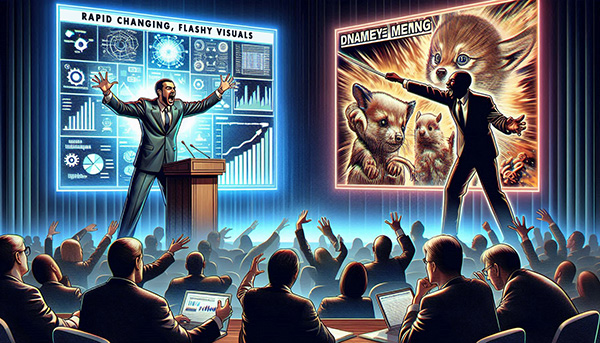By: John S. Morlu II, CPA
Introduction
In a world where instant gratification reigns supreme and attention spans have been whittled down to mere seconds, one company has risen from the noise, capitalizing on this trend to its fullest: Short Attention Span Incorporated (SASI). In the age of TikTok dances that vanish in the blink of an eye and tweets barely long enough to form a coherent thought, SASI has built an empire on the fleeting moments between swipes and scrolls. Leading the charge is their enigmatic CEO, Slacky McScroll, a self-proclaimed master of brevity who famously declared, “Why bother reading books when you can summarize them into memes?”
SASI’s meteoric rise was fueled by the growing culture of minimalism—when it comes to both time and thought. Their business model? Deliver content in under 10 seconds, ensuring consumers never need to pause for depth or nuance. Their proud tagline? “Who has time for details?” With Slacky at the helm, SASI’s quick-fix solutions attracted a generation conditioned to believe that success, insight, and knowledge could be condensed into bite-sized, easily digestible snippets. Their philosophy was simple: in a world where everyone is constantly distracted, detail is overrated.
But is it? Does true business wisdom come from fleeting fragments, or is there an inherent value in slowing down, diving deep, and investing time in the written word? While SASI’s empire grew in the fast lane, another force was quietly gaining momentum, representing a powerful counterbalance: the idea that real, sustainable success is built on depth, thoughtfulness, and—most importantly—reading.
In the clash between quick consumption and deep contemplation, SASI may have mastered the art of surface-level appeal, but the battle for long-term success is far from over. As we delve into the rivalry between this flash-in-the-pan company and its intellectual counterpart, we’ll explore why the business world—contrary to Slacky’s beliefs—still thrives on the power of reading, strategy, and thoughtful engagement. Prepare to dive into a satirical, yet telling, examination of how attention spans and business wisdom are evolving in the digital age.
Chapter 1: Enter the Antagonists: The Bookworms
While Short Attention Span Incorporated (SASI) was conquering the world one viral cat video at a time, there existed a quieter, more methodical force operating behind the scenes: Bookworms Enterprises. This under-the-radar company catered to a mysterious group of humans who still believed in the audacious notion that success didn’t come from mindless scrolling, but from something far more radical: reading. You heard that right—reading.
Helmed by the brilliant yet seemingly ancient (only in habit, not age), Hermione Pageturner, Bookworms Enterprises was the polar opposite of SASI. Hermione, an unapologetic bibliophile, was known for wearing glasses even though her vision was 20/20—just to look the part. She proudly flaunted her towering bookshelves lined with actual paperbacks, their pages worn and creased from countless hours of study and contemplation. Her morning routine? A cup of coffee and two chapters of Tolstoy before answering any emails. Slacky McScroll would have fainted at the very idea.
Their tagline? A bold and defiant challenge to the fast-food content churned out by SASI: “Read. Think. Conquer.” While Slacky’s empire relied on pumping out 10-second clips and meme-summaries, Hermione’s company believed in something far more scandalous in today’s age—thinking before acting. Crazy, right?
Bookworms Enterprises thrived on a different business model: they actually expected people to slow down and, brace yourself—learn something. While SASI’s audience skimmed through life, Bookworms’ clients read long-winded emails, flipped through detailed reports, and devoured entire books with glee. It was a company for people who believed that you couldn’t just shortcut your way to success. In fact, Hermione had a strict no-Twitter policy in the office; the thought of condensing meaningful insights into 280 characters gave her hives. Meetings were scheduled around chapters of “The Art of War” and employees were encouraged to bring annotated copies of “Thinking, Fast and Slow” to brainstorm sessions.
Now, it wasn’t that Slacky McScroll and Hermione Pageturner hated each other. No, that would have required too much emotional investment for Slacky, who only had a 7-second window before his attention wandered elsewhere. They simply occupied different worlds. For years, these two companies coexisted like night and day, each thriving in their respective corners of the business ecosystem.
SASI churned out bite-sized morsels of content for companies that needed “quick insights” (usually to avoid dealing with actual problems). Their clients? Business owners who proudly proclaimed they could manage an entire company off a smartphone. Detailed analysis? Pfft, who needs that? Their target market was anyone too busy to read beyond a headline or, worse, an email with more than one paragraph. It was a power scroll or perish kind of vibe. Efficiency at the expense of understanding.
Bookworms Enterprises, on the other hand, had no time for such frivolities. Their clients were a special breed—those who relished a deep dive into complex topics, even if it meant hours spent in the world of ink and paper. Bookworms’ customer base included philosophers in Silicon Valley start-ups, hedge fund managers with book clubs, and even a few eccentric billionaires who spent more time at the Library of Congress than in boardrooms. Hermione’s business catered to those who not only believed that knowledge is power but that deep, well-considered knowledge was the ultimate superpower.
Where SASI offered productivity tips wrapped in 10-second TikToks with upbeat music, Bookworms Enterprises provided entire seminars on how to strategically think like a Napoleonic general—with historical footnotes, of course. Their clients were the kind of people who threw around terms like “long-term strategic planning” at cocktail parties and carried leather-bound notebooks to business meetings.
Slacky’s SASI was a hit with start-ups looking for fast cash and a way to grow at lightning speed. But Bookworms Enterprises? They were the choice for companies looking to build something lasting, something with substance—those rare firms that believed slow and steady wins the race.
In one memorable encounter, Slacky tried to pitch a SASI-produced video to a company executive who turned out to be a Bookworms client. Slacky was certain his latest production—a 12-second clip on the “Top 5 Secrets to Business Success” (spoiler: one of the secrets was “don’t overthink it”)—would be a slam dunk. He proudly presented the video, thinking he’d wow them with how little time they’d need to “get it.”
The executive, a soft-spoken gentleman who happened to have a first edition of “The Wealth of Nations” displayed behind him, raised an eyebrow. He listened patiently to Slacky’s pitch, then calmly asked, “And how exactly does one not overthink the future of their company?” Slacky blinked. Silence. He checked his watch—already bored.
Meanwhile, across town, Hermione was conducting a client workshop titled “Strategic Thinking: How Reading ‘War and Peace’ Can Teach You to Manage Your Business in 5 Acts.” The session was sold out, naturally, because everyone knew Bookworms’ clients were in it for the long haul. Slacky was too busy chasing the next viral moment to realize that while speed may grab attention, it’s depth that builds empires.
The battle lines were drawn. On one side, you had Slacky and his army of fast-consumers, whipping through the latest fads and riding the wave of short-lived trends. On the other, Hermione and her slow-moving, deliberate thinkers who preferred the wisdom of the ages over the adrenaline rush of likes and retweets.
In the end, Slacky McScroll and Hermione Pageturner weren’t just competitors; they represented two fundamentally different philosophies of business—and life. SASI appealed to those who valued immediate gratification and efficiency over substance, while Bookworms Enterprises stood as a testament to the old-fashioned idea that some things—like wisdom and success—can’t be rushed. As Slacky was fond of saying, “Who has time for details?” Meanwhile, Hermione’s favorite retort remained: “Those who succeed.”
And the saga continues: a world divided between the slackers and the scholars, the scrollers and the readers. In the grand scheme of things, it would seem that those who pause, think, and engage deeply might just have the last laugh.
Chapter 2: The Epic Battle of 2024: TikTok vs. Tolstoy
As the calendar turned to early 2024, tensions brewed between the two business titans. Slacky McScroll, fed up with the dull echoes of the library aisles and whispers of wisdom, decided it was high time for a showdown that would put all others to shame. After all, what’s more thrilling than a heated battle for the hearts and minds of the corporate world? “Who needs deep thinking when you have quick reflexes?” he taunted over a dizzying array of TikTok dance videos featuring office supplies as props.
SASI’s strategy was a brazen one: drown out the Bookworms with a cacophony of flashy marketing videos, memes, and an endless stream of “hot takes” on every trending topic imaginable. Their goal? Create so much noise that no one would even think to pause long enough to read a book. Why ponder when you could watch a video of a cat playing piano while someone spouted business tips at lightning speed?
Meanwhile, Hermione Pageturner was far from impressed by Slacky’s shenanigans. With a firm grip on her trusty highlighter and an ever-expanding collection of strategy books, she gathered her team in a cozy reading nook furnished with oversized bean bags and stacks of leather-bound volumes. “Let them have their memes,” she said, adjusting her reading glasses with a knowing smile. “Our clients prefer something with substance.” After all, how could one ever think critically on an empty mind fueled only by superficial sound bites?
The clash between TikTok and Tolstoy was on. Slacky took to the digital battleground, employing every gimmick in his arsenal: countdown videos, flashy graphics, and relentless “#KnowledgeIsOverrated” hashtags. His office resembled a perpetual high-energy rave where ideas were distilled into pithy one-liners and catchy jingles. “Who has time for deep dives?” he preached. “Let’s keep it shallow and fun! #YOLO!”
In response, Hermione armed her team with quotes from the likes of Plato, Machiavelli, and even the occasional motivational poster featuring kittens. She knew the power of well-researched content could cut through the noise like a hot knife through butter. “Remember,” she told her team, “when they go low, we go deep. And we have Tolstoy on our side. Did I mention the man wrote an entire novel about a war? I dare you to summarize that in 30 seconds!”
With both sides rallying their troops, social media exploded into a frenzy of memes and quotes. Slacky’s followers engaged in enthusiastic discussions about how much better it was to watch a video than to read a long article. They claimed that if you couldn’t convey an idea in 15 seconds or less, it wasn’t worth conveying at all. But the Bookworms weren’t phased; they began counter-campaigns titled “Why Reading Matters,” using insightful infographics and compelling statistics to show that while scrolling may be quick, understanding is deep and lasting.
Fun Fact Break: Did You Know?
It’s a commonly ignored fact that the average CEO reads around 60 books a year. And those aren’t just the latest Harry Potter installments (though who wouldn’t want to read about a boy wizard?). We’re talking strategy books, biographies, and historical accounts that can transform the way you think and operate. Elon Musk famously attributed much of his success to reading. His personal favorite? The Hitchhiker’s Guide to the Galaxy—a humorous book, no less, but packed with insights about the universe. It’s not just a guide for intergalactic hitchhikers; it’s a roadmap for success in unpredictable territories!
And let’s not forget Warren Buffett, who spends a staggering 80% of his day reading. Imagine what Slacky McScroll could have accomplished if he spent just 20 minutes a day with a good book instead of endlessly scrolling through LinkedIn polls that ask, “What’s your favorite coffee?”
As the battle raged on, both companies launched their respective campaigns. SASI flooded social media with polls asking, “Would you rather read a 500-page book or watch a 10-second clip?” Spoiler alert: 97% of respondents chose the clip. Meanwhile, Bookworms Enterprises organized live events featuring panel discussions titled “How Reading Helps You Become a Better Leader,” attracting audiences that included some of the most influential thinkers in the industry.
At one such event, Hermione presented a compelling case about how reading allows leaders to cultivate empathy and understanding—a necessary trait in a world that sometimes feels like it’s divided by TikTok dances and motivational quotes. She quoted former President Franklin D. Roosevelt, who once said, “Reading makes a full man.” With a slight smirk, she quipped, “But don’t worry, I’m not looking for full men; just a few enlightened souls will do.”
Meanwhile, Slacky scrambled to come up with a catchy phrase to counter her point. “Reading is for those who can’t keep up with the pace of change!” he tweeted, accompanied by a video of him juggling three phones, each playing a different TikTok dance trend. Unfortunately, the attempt fell flat when his audience started posting replies filled with quotes from Shakespeare, Socrates, and, of course, Tolstoy.
As the year progressed, the tension between TikTok and Tolstoy grew, each side increasingly convinced of the righteousness of their respective causes. Slacky threw a massive “Content is King” party, complete with confetti, dancers, and a live DJ, while Hermione organized a book fair with renowned authors discussing the virtues of deep reading and critical thinking.
In a dramatic turn of events, the battle culminated at the annual Business Innovators’ Summit in Las Vegas. The event, usually known for its flashy presentations and extravagant parties, became the arena for a grand debate: “Short Attention Spans vs. Long Reads: The Future of Business Thinking.”
Slacky, armed with a PowerPoint presentation of memes, memes, and more memes, swaggered onto the stage with a confident grin. “Why think when you can react?” he shouted, as the crowd erupted in laughter, nodding in agreement. Hermione, however, stood poised on the other side of the stage, clutching a hefty book titled War and Peace.
With a steady voice, she countered, “Because if we only react, we miss the opportunity to reflect, understand, and truly innovate.” The audience shifted, intrigued by the contrasting arguments.
As the debate raged, something unexpected happened: the audience started to engage. People began to realize that there was a place for both quick reflexes and deep thinking in the world of business. They shared memes that highlighted the importance of reading while engaging in discussions about how concise content could serve as a gateway to more profound ideas.
By the end of the debate, it was clear that the battle of TikTok vs. Tolstoy would not end with one victor; instead, it illuminated a powerful truth: there’s a time to scroll and a time to reflect, and each has its own value in the grand tapestry of business.
So, whether you’re dancing to a viral TikTok trend or flipping through the pages of a classic novel, perhaps it’s time to embrace the best of both worlds. After all, the real win lies in striking the balance between a sharp mind and a swift finger—where creativity meets comprehension, and where knowledge is the ultimate currency in the ever-evolving landscape of business.
Chapter 3: SASI’s First Mistake: Ignoring the Power of Knowledge
As the dust settled from the epic showdown between TikTok and Tolstoy, Slacky McScroll’s empire at Short Attention Span Incorporated (SASI) began to feel the tremors of reality. His advisors, a quirky bunch who believed that “cutting to the chase” was the holy grail of communication, made a monumental oversight: they underestimated how much people actually love a good, long read. Perhaps they thought that attention spans had shrunk to the size of a goldfish, but they were dead wrong.
Slacky, fueled by a barrage of flashy social media posts and adrenaline-pumping TikTok challenges, declared, “Why waste time with dense texts when you can skip to the fun part?” This philosophy quickly permeated his company’s content. Soon, SASI was churning out advice that read like the script for a low-budget infomercial: “Just do it! Or don’t. It doesn’t matter!” A classic case of “you do you,” if you will. The only problem? People began to realize that such platitudes were as satisfying as a soggy piece of toast.
In a world where every business transaction hinged on careful analysis and strategic planning, Slacky’s catchy but meaningless catchphrases quickly lost their appeal. The corporate audience, once enamored with his flashy approach, began to question: “What’s the point of this? What’s the strategy behind ‘don’t bother?’” After all, running a business requires more than just catchy slogans and viral dance moves—it requires a deep understanding of the industry, market trends, and an awareness of what drives success.
Meanwhile, Bookworms Enterprises, under the astute leadership of Hermione Pageturner, was flourishing. While Slacky was busy creating TikTok videos featuring office supplies attempting to dance, Hermione’s team was churning out detailed white papers on business strategies and in-depth market analyses that even included footnotes (yes, the dreaded footnotes!). These weren’t just the usual fluffy reports filled with buzzwords; they were meticulously crafted documents that provided real insights into the challenges facing businesses today. “Why be vague when you can be specific?” Hermione often quipped during team meetings, much to her team’s delight.
Their clients thrived, discovering that businesses led by serious readers not only made better decisions but also possessed a surprising side effect: longer attention spans! Imagine that! They could sit through meetings without checking their phones every five seconds, discussing supply chain disruptions and tax audits with a level of focus usually reserved for a riveting cliffhanger in a novel.
Here’s the kicker: while SASI’s followers began to feel intellectually deprived, Bookworms’ clients were enjoying the benefits of enhanced critical thinking. They were diving deep into analytics and emerging with actionable insights, ready to tackle the real-world problems that come with running a business. These businesses found themselves outperforming competitors who had subscribed to the quick-fix, superficial content approach.
Fun Fact Break: Did You Know?
Research shows that reading stimulates the brain, improving cognitive function and enhancing memory. In fact, studies have indicated that reading regularly can lead to better analytical skills and problem-solving abilities. So, while Slacky was busy generating soundbites, Hermione’s clients were diving into the deep end of the knowledge pool, swimming laps around their competitors. Who needs flashy dance moves when you have a treasure trove of insights at your fingertips?
As time passed, Slacky noticed something unsettling: his empire was losing clients, and those that remained were less than enthusiastic. The buzz around SASI’s quick content was fading faster than last week’s trending TikTok dance. His marketing team desperately churned out memes, but they fell flat, like a soufflé that had been left to collapse. “I don’t understand it,” Slacky lamented in a company-wide meeting. “We’ve got the glitz! We’ve got the glam! Why aren’t they eating it up?”
With a furrowed brow, his advisors pointed out the elephant in the room: “Slacky, people are looking for real substance, not just style.” It was a shocking revelation, akin to discovering that the emperor had no clothes. They had all been so caught up in the flashiness of the brand that they had neglected the core of what makes businesses thrive—real knowledge and insightful analysis.
Realizing the folly of their ways, Slacky made a desperate plea to his team: “Let’s get serious! We need to produce something of value. Can we just… read a book or two? Maybe throw in some charts or graphs?” The reaction from the team was one of disbelief mixed with cautious optimism. They were thrilled at the thought of producing something substantive, yet they couldn’t help but laugh at the irony of their leader’s sudden epiphany.
Thus began SASI’s transformation. They dove headfirst into creating longer-form content, channeling their inner Hermione Pageturner. Slacky even dusted off a few business books from his neglected shelf, determined to glean some wisdom from their pages. However, it was a comical sight to see him attempt to summarize Tolstoy’s War and Peace in a TikTok video. “So, there’s this war, and… peace happens? Maybe? Just read it!” he declared, waving his hands dramatically, inadvertently resembling a cartoon character in mid-meltdown.
As SASI slowly transitioned into producing quality content, they found their footing again. They started to infuse their quick bites with substance, mixing humor with valuable insights. The transformation didn’t happen overnight, but with each detailed analysis and every well-researched article, they began to rebuild their reputation, proving that there’s room for both speed and depth in the fast-paced world of business.
In a world where distractions abound and attention spans seem perpetually limited, Slacky McScroll learned an invaluable lesson: sometimes, you have to slow down to speed up. And as he embraced the power of knowledge, he realized that while TikTok may be fun, the real treasure lies in the wisdom of well-read minds. In the end, whether you’re jamming to a catchy jingle or diving into the depths of a classic novel, the balance of entertainment and enlightenment is what truly propels success forward.
Chapter 4: The Second Mistake: Underestimating Podcasts
Slacky McScroll, now a seasoned veteran in the art of underestimation, made his second major blunder when he decided to launch a “business insight” campaign aimed at cutting out all the “fluff.” With a grand gesture that could only be described as a verbal mic drop, he declared, “Who has time for 20-minute podcasts when you can watch a 15-second reel?” As if the digital world needed more fleeting content that vanished faster than a Snapchat photo.
Little did Slacky know that he had inadvertently positioned himself against a rising tide. In the world of business, there was a secret weapon that he had entirely overlooked: podcasts. While Slacky focused on quick-hit content, countless entrepreneurs were tuning in to podcasts during their morning commutes, lunch breaks, and even while pretending to work out (we’ve all seen the treadmill-surfing podcast listener). Notably, Bill Gates, who reportedly devours audiobooks and long-form podcasts with the enthusiasm of a child on Christmas morning, would be aghast at Slacky’s remarks. “If only he knew what he was missing!” Gates might have mused, probably while adding another 30 books to his Audible library.
As SASI’s team churned out flashy reels, complete with bouncing emojis and dramatic music, they completely overlooked the fact that podcasts provide deep dives into important business topics. Those 20-minute audio segments weren’t just background noise; they were treasure troves of information, insights, and expert opinions that gave listeners valuable time to reflect, learn, and grow. Just think about it: when was the last time a TikTok video made you reconsider your life choices? Exactly.
Meanwhile, Hermione Pageturner of Bookworms Enterprises was having a grand old time, shaking hands with the podcasting community like she was at an industry gala. She encouraged small business owners to take just 30 minutes each day to listen to interviews with top entrepreneurs, thought leaders, and even philosophers (yes, really—she wasn’t joking). “You never know when Socrates might drop a gem about ethical leadership,” she’d say, adjusting her glasses with a wink.
Hermione hosted a series of podcasts called “The Literary Leap,” where she interviewed everyone from local business owners to international thought leaders. The format? Casual conversations about big ideas wrapped in the warm blanket of engaging storytelling. Each episode was like a cozy chat over coffee, where insights were served alongside the pastries. Small business owners began to flock to her podcast, realizing that these longer formats were rich with wisdom that could reshape their business strategies.
Fun Fact Break: Did You Know?
Podcasts have been shown to enhance retention of information compared to traditional reading. Research from the University of California found that listeners are more likely to remember concepts discussed in podcasts than those read in articles. So while Slacky was busy crafting his flashy, bite-sized content, Hermione’s podcast audience was busy becoming the smartest people in the room.
As the weeks went by, Hermione’s audience grew, and with it, the momentum of Bookworms Enterprises. Listeners would share their favorite episodes in online forums, hashtagging #PodcastForSuccess and creating a community that thrived on shared knowledge. These discussions not only broadened horizons but also cultivated a culture of continuous learning. In a world where the clock ticks relentlessly, small business owners found solace in these extended conversations, reminding themselves that time spent listening was an investment in their growth.
Meanwhile, Slacky and his team faced a growing dilemma: their catchy reels weren’t cutting through the noise like they had hoped. Followers began to drift away, seeking the rich, immersive experiences that Hermione was serving up on a silver platter. Some of his own employees even admitted to sneaking in a podcast during lunch breaks, giggling at the insightful banter that made them feel like they were part of something larger.
One particularly eye-opening moment came when Slacky overheard two interns chatting about a podcast episode featuring a famous entrepreneur discussing the importance of empathy in leadership. “Wait a minute,” Slacky thought, his mind racing. “Empathy? Isn’t that one of those ‘fluffy’ things I told people to ignore?” It was the first time he realized that, perhaps, podcasts weren’t just an annoyance to his business model but a legitimate avenue for knowledge. After all, what was business if not about understanding people—clients, customers, employees?
Emboldened by this revelation, Slacky decided to shift gears. He assembled a small task force, a ragtag group of eager young interns and reluctant veterans, to explore the podcasting landscape. “Let’s make our own podcast!” he declared, enthusiasm bubbling over like a soda can that had been shaken too much. “We can call it ‘SASI Insights—No Fluff Allowed!’”
“Uh, what about the fluff we previously discarded?” one intern quipped, trying to hold back a laugh. Slacky waved off the concern with a grand flourish, but deep down, he knew this could be a turning point for his company. They needed to embrace the longer format, to create content that encouraged discussion, debate, and critical thinking—things that couldn’t be distilled into a 15-second soundbite.
So, in a classic underdog story twist, SASI began crafting thoughtful, engaging podcast episodes that discussed real challenges faced by businesses today. They covered everything from navigating economic downturns to the nuances of workplace culture. To keep things light, they peppered in anecdotes and humorous moments from Slacky’s own misadventures—like that time he mistook a serious board meeting for a TikTok dance challenge. The feedback was instantaneous; listeners loved the mix of practical advice and genuine humor.
As SASI’s podcast gained traction, Hermione couldn’t help but chuckle at the irony. After all, it was her earlier strategic pivot into long-form content that had paved the way for her competitors to wake up and smell the coffee—while listening to a podcast, of course.
In the end, Slacky learned a valuable lesson that transcended mere business tactics: the importance of taking the time to dive deep, listen, and engage with substantive content. The world wasn’t ready to throw in the towel on meaningful conversations, and podcasts had firmly established their place in the business landscape. As he and Hermione raised their glasses in a good-natured toast at the annual Business Insights Gala, he couldn’t help but feel a sense of camaraderie with his once-competitive counterpart.
“Here’s to knowledge, the ultimate power move!” Slacky declared, a twinkle of newfound respect in his eyes. And with that, the battle lines blurred, opening the door for collaboration, growth, and a shared commitment to the power of understanding that would shape the future of business for years to come.
Chapter 5: Real World Example: YouTube’s Success Formula
Here’s a real-world example that Slacky’s team should have taken note of: YouTube. You remember YouTube, right? The digital treasure trove where you can find everything from dancing cats to dramatic cooking fails? Initially, the platform was famous for its short, entertaining clips—think “Charlie Bit My Finger” and DIY videos that somehow always ended in chaos. But as time rolled on and viewers evolved, so did YouTube.
Picture this: a few years back, viewers realized they could binge-watch entire seasons of tutorial videos and documentaries while enjoying their fourth cup of coffee. Suddenly, cat videos weren’t cutting it anymore; people wanted depth, details, and, let’s be honest, a little drama. Enter the era of long-form content! In recent years, YouTube pivoted to embrace this demand for more substantial viewing experiences.
Did you know that the president of YouTube, Susan Wojcicki (who is practically a rock star in the tech world), took the platform to record-breaking heights? Under her leadership, YouTube reached an astonishing 1 billion hours of content watched per day! That’s enough viewing time to binge every episode of your favorite series—twice—while still having time to ponder life’s big questions like, “Why do they call it a driveway when you park on it and a parkway when you drive on it?”
Now, the magic behind YouTube’s success isn’t just algorithmic sorcery; it’s understanding what viewers crave. People didn’t just want to see how to fry an egg in five seconds; they wanted to learn the intricate art of mastering the perfect omelet! They wanted to see the details—the hows and whys that go beyond just flashy visuals. And guess what? YouTube delivered. They nurtured creators who poured their hearts and souls into longer tutorials, in-depth documentaries, and engrossing storytelling. The result? Millions of hours of these longer videos being devoured by a hungry audience, eager for substance.
Meanwhile, Slacky’s team was too busy snipping away at content length to realize what was happening. “Let’s make our videos shorter,” they chirped, blissfully unaware that their audience was starving for more than a mere snack. They left viewers with little substance, tossing out 30-second snippets like they were at a hors d’oeuvre party where everyone left hungry. As a result, the audience’s hunger only grew, and they found themselves searching for something more fulfilling—much like seeking out a hearty meal after a long day of questionable takeout choices.
Here’s a fun tidbit: studies show that videos longer than 10 minutes can actually boost viewer engagement because they create a sense of investment. People are willing to sit through a longer video if they believe it’s going to provide them with valuable information or entertainment. Just like how people flock to the buffet when they know there’s a chance of dessert—everyone wants to feel rewarded for their time!
But alas, Slacky’s team continued to miss this golden opportunity. As their video length dwindled, their audience grew frustrated. “What’s next, a six-second motivational speech on how to run a Fortune 500 company?” they lamented, rolling their eyes. The team’s content resembled a buffet where all the good food had been replaced with mystery meat and soggy salad.
As YouTube capitalized on the demand for long-form content, Slacky’s team was stuck in a digital time warp, convinced that bite-sized content was the golden ticket. They failed to grasp that in an era where information is at our fingertips, people still yearn for connection and depth. A real-life example was staring them in the face, yet they chose to ignore it like a cat choosing to ignore its human after being fed.
Finally, one intern, fed up with the endless cycle of short, snappy content, decided to take matters into their own hands. “What if we created a series that’s actually worth watching?” they suggested, filled with enthusiasm. “Let’s dive deep into industry challenges, highlight success stories, and provide our audience with real insights!”
Slacky, caught off guard, leaned back in his chair. “Are you saying we should actually provide… substance?” he asked incredulously, as if the concept were akin to discovering fire.
“Yes! Imagine a series where we interview real business leaders, tackle their struggles, and provide genuine takeaways! We could even add some humor—like, what if we asked them about their biggest failures? People love a good story!”
Suddenly, the wheels in Slacky’s head began to turn, and he could almost hear the lightbulb flicker to life. This could be the turning point! They decided to adopt a hybrid approach—short, catchy teasers for social media to reel in the audience, followed by longer, meatier content on their website.
Their first episode featured a dynamic entrepreneur who shared the story of launching a startup during a global pandemic, complete with amusing anecdotes about failing spectacularly at remote team-building exercises (think Zoom mishaps and pets stealing the spotlight). The result? The episode not only captured their audience’s attention but also engaged them with real, relatable content that added value to their lives.
In the end, the lesson was clear: while quick content has its place (hello, cat videos!), a successful strategy also embraces depth and detail. In a world bombarded with superficial snippets, there’s a growing appreciation for longer, insightful content that encourages critical thinking and connection. Just as YouTube had shown, the formula for success often lies in knowing what your audience truly craves and providing it with flair, humor, and a generous sprinkle of common sense.
So here’s to Slacky McScroll and his revelation! In a world craving depth, it’s time to embrace the power of storytelling and the art of conversation. And who knows? Maybe one day, they’ll produce the next big thing—an inspirational podcast series that resonates with everyone, even if it does take 20 minutes to get to the good part. After all, isn’t that what life is all about?
Chapter 6: A Brief Intermission: The Tyranny of WhatsApp Forwards
Ah, WhatsApp forwards—those delightful little nuggets of information that travel faster than a rumor in a small town. You know the ones: a motivational meme featuring a cat hanging from a tree branch with the caption “Hang in there!” or the infamous “10 Ways to Boost Your Productivity Overnight” list that promises to change your life while you’re still in your pajamas. Slacky’s team, in their infinite wisdom, thought they could capitalize on this trend.
“Why waste time creating detailed content when we can just forward catchy quotes and memes?” Slacky proclaimed, as if he’d just discovered the secret to eternal life. The logic seemed sound in theory. Who wouldn’t want a life filled with uplifting quotes and shiny graphics? But here’s the catch: serious businesspeople—those champions of industry with far more important things to do than scroll through an endless feed of WhatsApp forwards—aren’t particularly swayed by a picture of a dog wearing glasses with a message about “taking life one bark at a time.”
So what happens when these well-intentioned tidbits of information land in the inboxes of seasoned professionals? Well, they’re typically met with a collective eye roll, followed by a swift delete. That’s right, the serious players in the game of business have learned the hard way that if you want to get ahead, you need more than a quirky meme or a quick tip. They crave substance, insight, and—dare we say it—real, meaningful engagement.
Meanwhile, over in the cozy corners of Bookworms Enterprises, Hermione Pageturner was busy plotting her own counter-strategy. Instead of succumbing to the tyranny of WhatsApp forwards, she chose to elevate her clientele. Her team crafted weekly reading lists that looked like literary smorgasbords, bursting with titles that ranged from cutting-edge business strategies to intriguing biographies that made people want to be better versions of themselves. Imagine a curated list that included everything from the latest hotshot entrepreneur’s memoir to a classic like “How to Win Friends and Influence People.” It was like Netflix, but for books—just with fewer cat videos.
And let’s not forget about the power of podcasts. Hermione recognized that people were not just looking for quick fixes; they wanted to dive deep into their industries, hear from thought leaders, and gain fresh perspectives. So, she sent out thoughtfully curated podcast recommendations alongside long-form articles designed to challenge, provoke thought, and deepen their understanding of their industries. It was like giving them the keys to a treasure chest filled with knowledge.
Fun Fact Break: Did you know that the average person receives around 100 WhatsApp messages a day? That’s a lot of cat memes and unsolicited “life hacks” about how to fold a fitted sheet! If you lined up all those messages in a row, they’d probably stretch for miles—probably enough to reach the moon and back, assuming the moon was made of puns and bad advice.
The result of Hermione’s strategic approach was eye-opening. Clients who once would have been tempted to scroll through Slacky’s glitzy little snippets found themselves drawn to Bookworms Enterprises. They began to appreciate the weekly reading lists as the business equivalent of a fresh, hot coffee on a Monday morning—invigorating, energizing, and guaranteed to spark some serious conversations around the water cooler.
Meanwhile, Slacky’s team was left scratching their heads. “Why isn’t our quick content resonating?” they pondered, oblivious to the fact that those slick, snappy memes were more like fast food—easy to consume but lacking the nutrition needed for real growth. They were missing the mark by thinking that the power of business lay in quick information bites rather than genuine engagement.
The lesson here is simple, yet profound: while it’s tempting to believe that short and sweet is the way to go in our fast-paced world, true value comes from diving deep. Businesses are built on relationships, understanding, and a wealth of knowledge—not on the latest viral meme that tells you to “just keep swimming” while ignoring the fact that you’re trying to navigate a shark-infested sea.
As the chaos of the corporate battlefield raged on, it became clear that while Slacky McScroll may have been trying to surf the wave of quick content, Hermione Pageturner was mastering the art of sailing. In a world filled with superficial glances and fleeting trends, she understood that real engagement and insightful content would always win the day. So, the next time you find yourself knee-deep in a WhatsApp thread filled with questionable wisdom, remember: sometimes it pays to read a book instead. After all, you can’t get a good grasp of a business problem from a cat meme.
Chapter 7: How SASI Finally Collapsed
The grand climax of this tale unfolded at the much-anticipated International Business Conference of 2024, a gathering where the titans of industry converged to exchange ideas, showcase innovations, and perhaps, swap the occasional awkward handshake. On one side of the stage stood Slacky McScroll, the purveyor of quick content and master of the meme. On the other side, Hermione Pageturner, the queen of substance and champion of the bookworms, prepared to unleash her arsenal of wisdom.
As Slacky strutted onto the stage, you could almost hear the crowd hold its collective breath. He was decked out in a flashy suit that could only be described as a cross between a disco ball and a very enthusiastic peacock. “Get ready for the future of business!” he announced, armed with a presentation that looked like it had been put together during a coffee break. Instead of data points and meaningful insights, it was a colorful collage of memes, GIFs, and an array of 10-second clips that seemed to scream, “Look at me! I’m super fun!”
The audience, a mix of seasoned professionals and wide-eyed entrepreneurs, initially chuckled at the absurdity of it all. “Oh, how clever!” they thought, their smiles like a flickering light bulb on the verge of burnout. However, as Slacky launched into a string of puns that felt as substantial as cotton candy—sweet but utterly lacking in nourishment—they soon found themselves drifting into a state of polite oblivion. You could almost hear the thoughts bouncing around the room: “Did I leave the oven on?” and “What’s the Wi-Fi password again?”
Enter Hermione, a vision of poise and purpose, armed with actual facts that could make even the most skeptical investor perk up. With a twinkle in her eye, she opened her presentation with a timeless quote from Mark Twain: “The man who does not read has no advantage over the man who cannot read.” Mic drop! The audience was suddenly alert, like a pack of wolves catching the scent of something intriguing.
Hermione proceeded to unleash a barrage of statistics that would have made even the staunchest data skeptic sit up and take notice. “Studies show that executives who read just one book a month outperform their non-reading counterparts by a staggering 20% in decision-making ability,” she declared, pacing the stage with the confidence of a seasoned performer. She painted vivid pictures of small business owners who had gone from zero to hero, turning their fortunes around simply by adopting a reading habit. “And let’s be honest,” she quipped, “who wouldn’t want to outsmart their competition with a little help from good old-fashioned literature?”
As Hermione spoke, you could feel the room shift. Heads nodded in agreement, pens frantically scribbled notes, and even the person in the back who had been checking their phone began to pay attention. It was as if Hermione had unlocked a hidden treasure chest filled with gems of knowledge, and the audience was desperate to fill their pockets.
Meanwhile, Slacky, still reeling from Hermione’s fact storm, was left fumbling for words. “Uh… memes?” he tried to pivot, but the moment had passed. His followers, who had once found joy in his fleeting content, were now awakening to the realization that maybe—just maybe—depth could be more beneficial than distraction.
The conference came to a close with Hermione receiving a standing ovation, the applause echoing like a heartbeat in the room. Slacky, on the other hand, stood awkwardly at the side, like the last slice of pizza left at a party—still there, but no one really wanted him anymore.
As attendees began to disperse, a curious phenomenon occurred. Slacky’s once loyal followers, who had been enamored with his light-hearted banter, found themselves unfollowing him in droves, their fingers tapping furiously on their phones like they were racing against time. They were flooding to Bookworms Enterprises, eager to subscribe to Hermione’s monthly book club and podcast recommendations. They had discovered the secret ingredient to success: real knowledge, real connections, and a real opportunity to grow.
Fun Fact Break: Did you know that nearly 60% of self-made millionaires report reading at least two books a month? Yes, that’s right! While Slacky was busy perfecting his TikTok dance moves, real entrepreneurs were flipping through pages and absorbing knowledge like it was the best-kept secret in business.
The collapse of SASI was not just a defeat for Slacky McScroll; it was a testament to the undeniable power of knowledge in an age saturated with fluff. Hermione had proven that when it came to business success, substance always reigns supreme over superficiality. So, as Slacky watched his empire crumble, he realized that perhaps he should have taken a page from Hermione’s book—literally.
In the end, the moral of the story is clear: you can have all the flashy memes and catchy slogans in the world, but when it comes to building a successful business, nothing beats the depth and insight found in a good book. So, the next time you find yourself drawn to the quick fix of viral content, take a moment to reflect. Because while memes may bring a fleeting smile, true knowledge has the power to transform lives, businesses, and yes, even the very fabric of reality.
Chapter 8: The Importance of Reading in Small Businesses
Now, dear reader, let’s talk brass tacks. If you’re a small business owner, you know there’s no shortage of challenges out there. Cash flow problems, hiring the right people, navigating the tangled web of taxes—oh my! It can feel like trying to juggle flaming swords while riding a unicycle on a tightrope stretched over a pit of alligators. But fear not, because we have the secret weapon to help you keep your balance: reading!
Yes, reading is the antidote to our quick-fix culture. In a world where everyone is looking for the next shiny shortcut, diving into a book gives you the depth of knowledge needed to make strategic decisions, adapt to market changes, and, most importantly, stay ahead of the competition. Think of reading as the trusty Swiss Army knife in your entrepreneurial toolkit—versatile, reliable, and it definitely won’t catch fire if you accidentally drop it.
Take, for example, the tale of Baker’s Bliss, a small bakery that was as popular as a cat meme but struggled with cash flow issues that made the owner’s hair turn gray faster than you can say “croissant.” When things got tough, the owner, let’s call her Betty, decided to take a step back from the whirlwind of icing cupcakes and decided to read Profit First by Mike Michalowicz—a book that’s as tasty as a double chocolate fudge brownie, but much healthier for your business.
Betty dove into the book, and it was like flipping a switch. Suddenly, she wasn’t just a frazzled baker; she became a financial whiz. She learned about allocating profits, setting aside money for taxes before it disappeared into the endless void of expenses, and implementing simple budgeting practices. In short, she transformed from “just getting by” to “who wants to franchise?”
Now, we’re not saying that reading is some kind of magical elixir—after all, no one is going to turn into a financial wizard just by flipping through the pages of a book (unless you happen to be reading a very niche self-help book titled How to Cast Financial Spells). But what Betty did next was even more impressive. She took the knowledge she gained and applied it like a master chef seasoning a perfect dish.
With a sprinkle of strategic planning and a dash of perseverance, Baker’s Bliss not only turned a profit but expanded to two more locations. Yes, you heard that right! Betty’s bakery wasn’t propelled to success by a viral TikTok video of her perfecting a whipped cream topping; it was the result of her dedication to reading and applying sound financial principles.
And here’s a fun tidbit for you: did you know that many of today’s most successful entrepreneurs—including the likes of Bill Gates, Oprah Winfrey, and Elon Musk—are voracious readers? They devour books like candy, because they understand that knowledge is power. In fact, Gates reads about 50 books a year! That’s more books than many of us can manage in a lifetime (sorry, but War and Peace might just be collecting dust on your shelf, right?).
Let’s be real for a moment. The reality is that small business ownership can feel overwhelming, and it’s easy to fall into the trap of seeking quick solutions. But investing time in reading provides the insights you need to solve problems, spark innovation, and navigate those tricky waters with confidence. It equips you to make better decisions—not just instinctively, but informed by the experiences and strategies of those who’ve come before you.
So, whether it’s a deep dive into financial management, marketing strategies, or even the psychology of consumer behavior, make reading a priority. Your business will thank you for it, and you might even find that your evenings are filled with more than just Netflix binges. You could be transformed into a business guru, ready to tackle whatever challenges come your way!
In conclusion, if you want to steer your small business away from the pitfalls of mediocrity, put down the scroll and pick up a book! You’ll discover that the pages contain not just words but wisdom—an investment that pays dividends far beyond the price of admission. And who knows? You might just become the next success story that inspires future entrepreneurs, all because you decided to take a seat with a good book and a cup of coffee. After all, even the busiest of bakers can take a moment to rise to the occasion!
Chapter 9: The Bottom Line: Don’t Be a Slacky, Be a Hermione
To wrap it up, if you’re serious about business success, it’s time to put down your phone (yes, that includes scrolling through cat memes) and pick up that book! Dust off that novel you’ve been meaning to read, queue up that long podcast you’ve been avoiding, or dive into that 1500-word article that looks like it could double as a doorstop. You might be thinking, “But who has time for that?” Well, here’s the kicker: while it may seem easier to digest quick, surface-level content, true growth comes from taking the time to dive deep, think critically, and expand your knowledge.
Imagine you’re trying to cook a gourmet meal. You wouldn’t just dump a few pre-packaged ingredients into a pot and hope for the best, right? (Unless you’re really hungry, in which case, all bets are off!) You’d carefully select your spices, marinate your meat, and maybe even watch a couple of YouTube videos to master that soufflé technique. The same principle applies to your business journey.
In the battle between Short Attention Span Incorporated and Bookworms Enterprises, there was only ever going to be one winner: the one who understood the value of depth and engagement. While Slacky was busy crafting bite-sized content that left his audience feeling like they’d just eaten cotton candy—sweet but ultimately empty—Hermione was serving up a hearty feast of information that left her clients satisfied and inspired.
And let’s face it, who wouldn’t want to be the Hermione of the business world? Hermione Granger, after all, was the poster child for success (and she had a pretty snazzy wand to boot). With her extensive knowledge and critical thinking skills, she could tackle any problem that came her way, whether it was battling trolls in the dungeon or tackling a tricky business strategy. So why not channel your inner Hermione and turn that potential into real-world success?
And here’s a fun tidbit: research shows that people who engage in regular reading not only improve their vocabulary and comprehension but also become better at problem-solving. That’s right! So, by simply picking up a book, you’re not just indulging your literary appetite; you’re sharpening your business acumen!
If you’ve made it this far in the book (or if you’re just skimming, no judgment!), congratulations—you’re on the winning side! You’re not just a passive consumer of content; you’re an active seeker of knowledge. This is the mindset that separates the Slackys from the Hermiones of the business world.
So, what are you waiting for? Go pick up that book, hit play on that podcast, or scroll through that article with purpose! Conquer the business world with the wisdom you’ve gained. Remember, every great entrepreneur started as a curious learner, so why not join their ranks?
In the end, it’s all about investing in yourself. Don’t be a Slacky who relies on surface-level insights. Embrace the challenge, dive into the depths of knowledge, and watch your business transform. After all, the world doesn’t need more fleeting content; it needs more thinkers, innovators, and doers who understand the value of thoughtful engagement.
Now, go forth and unleash your inner Hermione! Who knows what amazing adventures and discoveries await you just a page (or podcast) away? And remember: the business world is your enchanted forest, so gear up, read up, and let the magic of knowledge propel you to success!
Author: John S. Morlu II, CPA is the CEO and Chief Strategist of JS Morlu, leads a globally recognized public accounting and management consultancy firm. Under his visionary leadership, JS Morlu has become a pioneer in developing cutting-edge technologies across B2B, B2C, P2P, and B2G verticals. The firm’s groundbreaking innovations include AI-powered reconciliation software (ReckSoft.com) and advanced cloud accounting solutions (FinovatePro.com), setting new industry standards for efficiency, accuracy, and technological excellence.
JS Morlu LLC is a top-tier accounting firm based in Woodbridge, Virginia, with a team of highly experienced and qualified CPAs and business advisors. We are dedicated to providing comprehensive accounting, tax, and business advisory services to clients throughout the Washington, D.C. Metro Area and the surrounding regions. With over a decade of experience, we have cultivated a deep understanding of our clients’ needs and aspirations. We recognize that our clients seek more than just value-added accounting services; they seek a trusted partner who can guide them towards achieving their business goals and personal financial well-being.
Talk to us || What our clients says about us










